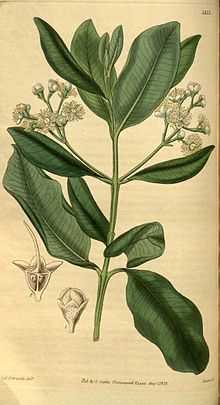Pimenta racemosa
| Pimenta racemosa | |
|---|---|
 | |
| Scientific classification | |
| Kingdom: | Plantae |
| (unranked): | Angiosperms |
| (unranked): | Eudicots |
| (unranked): | Rosids |
| Order: | Myrtales |
| Family: | Myrtaceae |
| Genus: | Pimenta |
| Species: | P. racemosa |
| Binomial name | |
| Pimenta racemosa (Mill.) J.W.Moore | |
| Synonyms[1] | |
| |
Pimenta racemosa is a species of plant in the myrtle family (Myrtaceae) that is native to the Caribbean region. Common names include West Indian bay tree,[2] bay rum tree,[2] and ciliment. It is used in cooking and an essential oil is distilled to produce a fragrant cologne called bay rum; although bay rum is essentially rum, the concentrated essential oil is toxic and renders the product undrinkable.[3] The tree is 4-12 m tall and the white flowers, about 10mm wide, become black, oval fruits measuring 7-12 mm.[4] The plants are now grown widely in other tropical areas, including Oceania. The ideal conditions for P. racemosa are regular irrigation and bright sunshine.
Ecology
Pimenta racemosa is widely introduced, and can become an invasive weed.[4][5]
References
- ↑ "The Plant List: A Working List of all Plant Species".
- ↑ 2.0 2.1 "Taxon: Pimenta racemosa (Mill.) J. W. Moore". Germplasm Resources Information Network. United States Department of Agriculture. 1997-05-22. Retrieved 2012-08-23.
- ↑ desert-tropicals.com: West Indian Bay Tree, Bay Rum Tree
- ↑ 4.0 4.1 Pacific Island Ecosystems at Risk (PIER): Myrtaceae: Pimenta racemosa (by J.W.Moore)
- ↑ "USDA PLANTS Profile".
External links
![]() Data related to Pimenta racemosa at Wikispecies
Data related to Pimenta racemosa at Wikispecies
![]() Media related to Pimenta racemosa at Wikimedia Commons
Media related to Pimenta racemosa at Wikimedia Commons